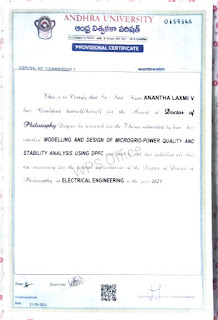Teacher/Instructor: Mrs.V.Anantha Lakshmi Department
of Electrical & Electronics Engineering Assistant Professor of EEE
Lesson Plan for a Day
IV B.Tech, Sem – I 2019-20
MICRO LESSON PLAN
(ACCORDING TO BLOOMS DIGITAL TAXONOMY)
|
Programme |
B.Tech, Electrical&ElectronicsEngineering |
|
Semester |
IV
Year-ISemester |
|
SubjectTitle |
PSOC |
|
SubjectCode |
R1641023 |
|
ClassHours |
5-Hoursperweek |
|
TotalHours |
70 |
|
Credits |
3 |
|
MaxMarks |
100 |
|
Unit&Title |
Unit-I:
- Economic Operation of Power Systems |
|
TeachingandLearning |
BlackBoard/PowerPointPresentation/Videos,E-material. |
|
Detailed – Lesson 1 Optimal operation of Generators in Thermal power
stations LessonObjectives: |
|
|
Factual |
Able
to compute optimal scheduling of Generators. Able
to understand hydrothermal scheduling. |
|
Conceptual |
Understand the
unit commitment problem. Understand
importance of PID controllers in single area and two area systems |
|
Procedural |
Able to understand importance of the frequency. |
|
Applied |
Will
understand reactive power control and line power compensation. |
Pre requisite Knowledge:
Working of
thermal power generating stations
MicroLessonPlan:Day-1. Optimal operation of Generators in Thermal power stations
Pre-task
Activity-Introducing the Optimum generation concept
In pre task activity, I planned to give introduction about of thermal power generation and the parameter that influence cost of the generation and need for operation of thermal stations for getting optimum cost.
1. In-classActivity: How to operate thermal plants to get optimum generation cost
Post–task Activity:
In Post task activity revising the class, and clarifying
the doubts and asking questions to know the response.
Discussion
·
Students will be able to remember the influencing
parameters.
·
The pre-task activity material will give them a conceptual
knowledge of how to get the optimum generation cost and its function
Summary
· To get optimum generation cost the incremental fuel costs of the individual thermal generating units must be same.
· At this condition we will come to know what is the load sharing of individual generating units.
References
Text Books:
·
T1.
Electric Energy systems Theory – by O.I.Elgerd, Tata McGraw–hill Publishing
Company
Ltd., Second edition.
·
T2.
Power System stability & control, Prabha Kundur,TMH
·
T3.
Modern Power System Analysis – by I.J.Nagrath & D.P.Kothari sTata Mc Graw –
Hill
Publishing Company
Ltd, 2nd edition.
Reference Books:
·
R1.Power
System Analysis and Design by J.Duncan Glover and M.S.Sarma, THOMPSON,
3rd Edition.
·
R2.
Power System Analysis by Grainger and Stevenson, Tata McGraw Hill.
·
R3.
Power System Analysis by Hadi Saadat – TMH Edition.
|
Taxonomy of Objectives: Specific Outcomes |
||||||
|
KnowledgeDimension |
The Cognitive Process Dimension |
|||||
|
Remember |
Understand |
Apply |
Analyze |
Evaluate |
Create |
|
|
A.FactualKnowledge |
SO-1,2 |
SO-1,2,3 |
SO-1,2,3 |
|
|
|
|
B. ConceptualKnowledge |
SO-1,2,3 |
SO-1,2,3 |
SO-1,2,3 |
|
|
|
|
C. ProceduralKnowledge |
|
|
|
|
|
|

